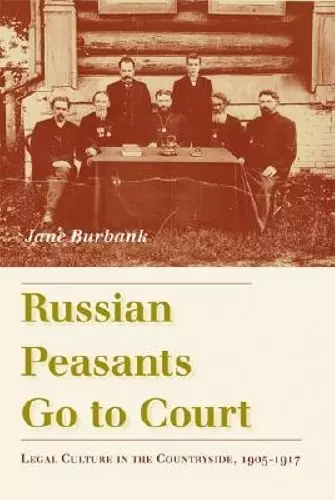Russian Peasants Go to Court
Legal Culture in the Countryside, 1905-1917
Format:Hardback
Publisher:Indiana University Press
Published:16th Sep '04
Currently unavailable, and unfortunately no date known when it will be back

A pathbreaking study of the legal culture of Russian peasants in the closing years of the Russian Empire.
Brings into focus the legal practice of Russian peasants in the township courts of the Russian empire from 1905 through 1917. This text demonstrates that Russian peasants made effective use of legal opportunities to settle disputes over economic resources, to assert personal dignity, and to address the bane of small crimes in their communities.
". . . will challenge (and should transform) existing interpretations of late Imperial Russian governance, peasant studies, and Russian legal history." —Cathy A. Frierson
". . . a major contribution to our understanding both of the dynamic of change within the peasantry and of legal development in late Imperial Russia." —William G. Wagner
Russian Peasants Go to Court brings into focus the legal practice of Russian peasants in the township courts of the Russian empire from 1905 through 1917. Contrary to prevailing conceptions of peasants as backward, drunken, and ignorant, and as mistrustful of the state, Jane Burbank's study of court records reveals engaged rural citizens who valued order in their communities and made use of state courts to seek justice and to enforce and protect order. Through narrative studies of individual cases and statistical analysis of a large body of court records, Burbank demonstrates that Russian peasants made effective use of legal opportunities to settle disputes over economic resources, to assert personal dignity, and to address the bane of small crimes in their communities. The text is enhanced by contemporary photographs and lively accounts of individual court cases.
Using numerous case records from volost courts from 1905 to 1917, Burbank (New York Univ.) argues that the peasants who judged and were judged in these courts showed notable respect for law and legal procedure. The panel of judges, a small jury in the author's thinking, was guided by reason, a concern for documentary proof, and the evidence of witnesses, the hallmarks of the legal order that went unrecognized by contemporary educated society. Burbank believes that the disparagement of peasant justice as disorderly, corrupt, and ignorant was based on data from the 19th century. But she also disagrees with those who see peasant justice as a protest against the state and its laws. Her argument is persuasive, especially when she presents peasants as individuals rather than exemplars of a class. Only in passing does she suggest that her peasant actors may have been more enterprising than others. Although Burbank disagrees with critics of peasant justice, their data for the 19th century is also persuasive. Moreover, readers may not share the author's perplexity that her law-abiding, but admittedly uncivil, peasants made a revolution in 1917. But they should read her book. Summing Up: Recommended. Upper-division undergraduates and above.
-- D. Balmuth * emeritus, Skidmore College , 2005jun CHOICISBN: 9780253344267
Dimensions: unknown
Weight: unknown
400 pages